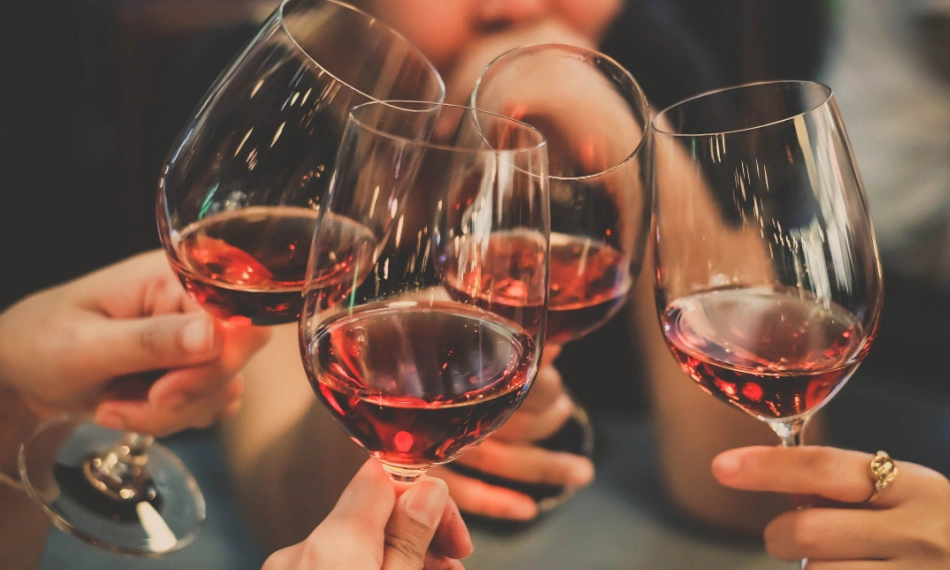Does Wine Break a Fast? Decoding the Fasting Rules
Our team is unlocking the mystery of wine in your fasting routine

Imagine this: You’ve just completed a disciplined fast, and now you’re looking at that elegant wine bottle, pondering a crucial question: does wine break a fast?
We must delve into the heart of this dilemma before we unravel the mystery. It’s no easy feat to strike a balance between the rich, inviting flavors of fine wine and your dedication to fasting.
We’ll explore intermittent fasting’s intricacies, savor the facts, and decide if a glass of wine can coexist with your wellness goals.
Does Wine Break a Fast? Exploring the Truth
As wine is made from grapes and contains primarily carbohydrates, consuming it will interrupt a fast.
Through caloric restriction, intermittent fasting may activate autophagy, a cellular process that removes defective proteins, damaged organelles, and dead cells. A 5-ounce glass of wine contains 125 calories, which may delay this process as the body focuses on metabolizing the nutrients it receives.
Aside from interrupting the fasting state, wine consumption during feeding windows should be cautious. The liver prioritizes metabolizing alcohol during these periods, affecting the processing of other nutrients. Allowing alcohol while fasting will depend on the specific goals of the person doing the fast.
This means that if your purpose is to detoxify your body, you should know that wine will be disrupting this process. However, if you are initiating fasting for weight loss, you could be more flexible and treat yourself to an occasional glass.
It is important to remember that there are many types of wine, each with a specific amount of carbohydrates and calories. People with diabetes or insulin resistance should stay away from sweet wines because of their higher carbohydrate content.
Drinking Wine During Intermittent Fasting: Do’s and Don’ts
Before you take the leap into intermittent fasting, it’s wise to keep a few rules in mind so you don’t get caught by surprise. If you want to make wine part of your diet, check out these tips to minimize any negative effects:
#1 Don’t break your fast for a glass
Rather than reaching for the wine during your fasting window, a more strategic approach would be to incorporate it into your eating period. As such, the wine will complement your nutritional intake without interfering with your fast.
If you carefully integrate wine into your meal plan, you can manage your calorie intake effectively, ensuring that every sip aligns with your dietary goals.
#2 Don’t drink wine in the evening
Taking a warm bath in the evening with a glass of wine in hand is the epitome of relaxation. But when it comes to your sleep quality, it’s worth thinking more critically about this picturesque scene.
It might seem like alcohol is a ticket to tranquility, but it can actually disrupt your sleep cycle. Drinking alcohol close to bedtime can have a significant impact on your sleep architecture. You might get more sleep faster, but your REM cycle might be interrupted, leading to a night that is anything but restful.
#3 Do savor some of its antioxidant and anti-inflammatory qualities
If you are embracing fasting as a part of your health-conscious lifestyle and considering incorporating wine in moderation, it’s important to be informed about the potential impacts of this alcoholic drink.
When consumed in moderation, red wine may have benefits for gut flora, neurological health, and even inflammation reduction, but consider these benefits alongside your dietary habits and overall health goals. Moderation is the key, and you should consider how wine fits into your diet and lifestyle.
#4 Do combine the appropriate food with your wine
Managing your blood sugar levels can be made easier if you pair your glass of wine with a meal that’s abundantly rich in protein and fiber. With the presence of fiber and protein in your meal, the absorption of carbohydrates is slowed down. Thus, your blood sugar levels rise more gradually instead of experiencing rapid spikes.
As a result of moderated absorption, especially when sipping wine, the carbohydrates from your meals and drink are processed in a more controlled and steady manner. Mindful pairings not only enhance the culinary experience, but also cater to health-conscious eating habits.
Alternatives and Tips
There is no doubt that wine is a great source of antioxidants, but when you have set a specific weight loss goal, it is best to look for alcohol-free sources of antioxidants to avoid sabotaging your progress.
A good way to learn how to make smart food choices is by using fasting apps as they contain hundreds of recipes, nutritional information, and progress tracking.
Being aware of what you put into your body will help you have a healthy relationship with your diet. You may be asking yourself: why would a drink like wine sabotage my weight loss?
Alcohol is not a nutrient and can be toxic, so the liver prioritizes its metabolism over other substances. During this time, processes such as fat burning may be slowed down.
Also, some varieties of wine can be very high in calories, so you can opt for other alternatives such as:
- Low-calorie wines: Check if the label says “light” or “low in calories”. This way, you can enjoy a glass without going over your nutritional requirements.
- Non-alcoholic wine: This type of wine is processed to remove alcohol and is a good option to maintain your progress while practicing intermittent fasting; however, some options are high in carbohydrates, so you should read the nutritional label carefully. Keep in mind that non-alcoholic wine also contains calories, therefore, it will break your fast.
- Water as the best option: Feeling very hungry during fasting windows? Maybe you are thirsty! Staying hydrated will help you not to confuse thirst with hunger. In addition, water supports organs to fulfill their detoxifying function.
A Word From Our RD


Don’t drink your calories! One of the goals of intermittent fasting is to lose weight. It’s important to track the calories you take in during eating windows.
To improve satiety – which is essential to avoid eating in fasting windows – it’s better to eat 150 calories of a high-fiber meal rather than 150 calories of wine that won’t take away your hunger.
It is true that drinking alcohol during your eating periods may unexpectedly affect your hunger signals. Alcohol is thought to affect appetite because of its potential interaction with leptin.
Normally, leptin signals fullness to the brain, but alcohol can sometimes disrupt this process, causing an increased sense of hunger. Therefore, when planning your meals and snacks during feeding windows, be aware of alcohol’s complex role in hunger regulation.
FAQ
Yes, in addition to breaking the fast, some high-calorie and high-carbohydrate wines can affect ketosis and fat burning.
High-carbohydrate wines, such as Moscato and Port, may interfere with fasting by raising blood sugar levels. As a result of this spike, insulin, the hormone responsible for regulating blood sugar, can fluctuate, impacting the metabolic state of fasting.
It is not okay to drink any wine during the fasting window as it will break your fast. Choose dry wines such as Cabernet or abstain from alcohol entirely during your eating window if you want faster results.
Conclusion
Deciding whether to drink wine during intermittent fasting is a personal decision as it will depend on your goals.
If you practice fasting to improve your health, you can enjoy this drink eventually in moderation to avoid the harmful effects of alcohol.
Otherwise, if you have embarked on a weight loss journey, it is best to consider alcohol-free alternatives, as wine can affect autophagy and ketosis.
Are you a wine lover? To have a successful fast, don’t leave room for doubt. Share your experience with the Health Reporter community in the comment section.

















































 Select your language:
Select your language: 







